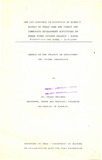Location
Our Vision is to be a world-class university committed to scholarly excellence.
Our Mission is to provide quality university education and training and to embody the aspirations of the Kenyan people and the global community through creation, preservation, integration, transmission and utilization of knowledge.
Core Values
In order to realize the above vision and mission, certain shared values shall be nurtured. There is great need for the University to be guided by the right values derived from the virtues and moral standards of the Kenyan and wider society.
Core Functions
Teaching and Learning: The university offers innovative , relevant and market driven academic programmes , both at undergraduate and postgraduate levels with inbuilt quality control systems the university also provides an environment and policy framework for undertaking high quality and relevant research
Members:
Resources
Displaying 266 - 270 of 298Evalution Of Women's Access To Urban Land And Credit And Community Development Activities In Urban Three Housing Project - Kenya Eldoret-Sirikwa Hotel - 26-6-1989
In most Developing countries only a small number of new jobs
are available in agriculture. The capital scarcity limits the
number of nonfarm jobs that can be created, because investments
costs per job are high in modern industry. Thus an effective
development policy should seek to increase the labor relative to.,
capital, to the extent that it is economically efficient.
In the Sessional Paper No. 1 of 1986 on Economic Management
for Renewed Growth, the Kenya Government notes that
historically, there has been
The effect of existing land tenure systems on urban land development: A case study of Kenya's secondary towns, with emphasis on Kisumu
The Kenya Government has over a number of years pursued policies geared towards the promotion of secondary towns. Included in this strategy is the achievement of an orderly and coordinated urban land development. However, experience from these towns indicates that, planned land development has encountered a lot of bottlenecks particularly in relation to the institution of private ownership of land. This paper traces the land tenure systems that have existed in the Kenya’s secondary towns.
Urban Planning and the Law in Kenya
This article discusses the nexus between urban planning and the law in theory, and the role that law plays in the urban planning process in Kenya. The theoretical discussion focuses on the use of law as a regulatory mechanism and concludes that no universal theory of the role of law in the urban planning process can be identified. The discussion on law and urban planning in Kenya, on the other hand, is an attempt to apply theory to the Kenyan situation. In Kenya today, there exists a private and a public legal regime for the regulation of land use in urban areas.



